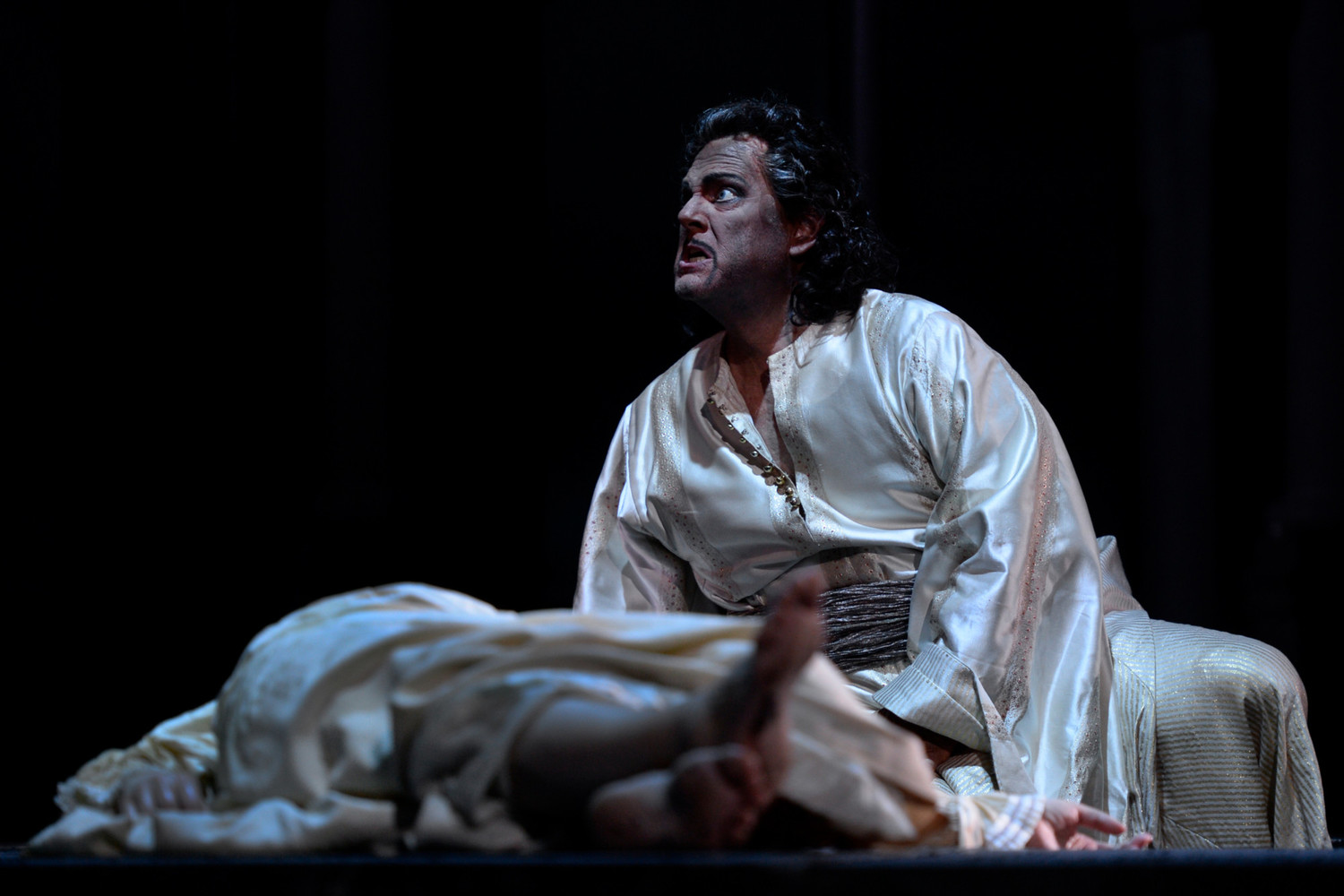Review: OTELLO at the Opera de Monte-Carlo

The closing of the Monte-Carlo Opera season of 2018-2019 could not have ended better than with the new production of Verdi's Otello. And Monaco knew it: under the keen direction of Daniele Callegari and based on the play by Shakespeare, the opera was completely sold-out (to the disappointment of people waiting in line to catch a last minute seat).
From the beginning, the audience was swept away into a brilliant start. With nearly the full cast on stage for the opening act, the artists were slightly concealed by a see-through screen on which the storm of the tale was projected. A spiraling step and a walk bridge in classical style faintly showed through the clouds and lightning, as the performers prayed for safe passage of Otello's ship through the turmoil. One could only be dragged into the story.
However, though this was an excellent start and promised for more, one could have gotten confused by the image of a man being projected on the screen. One would think it was Otello, which only caused some surprise when the real Otello, played by the American Gregory Kunde, came on stage and confessed his love for Desdemona. The ambiguity of the man in the projection was only highlighted even more when the man came on stage in the role of a guard, coming on and off of the stage at several moments, yet not moving or saying a word. Though the role contributed to the setting and placing, because of his projection, one may have been "caught off guard" and expected more from this personage.
Nevertheless, the strength of the beginning of the opera was carried through the first acts. Bursts of applauds and cries of appreciation washed over the performers between acts, as if the audience was finally freed from the grasp and the constraints of holding back their admiration. Quite genius, Verdi only introduces the first female solo voice at the end of the first act, thereby, even more, glorifying the beautiful voice of Maria Agresta, playing the role of Desdemona.
.jpg) In the second act, the plot was beautifully laid out for the audience. The devilish act of the villain Iago (played by George Petean, who evidently was the man in black, leather and with a cape), the innocence and deep love of Otello and Desdemona, and the use of the old-time favorite of creating hurt, blindness, turmoil, and anger: jealousy. Both Shakespeare's as Verdi's brilliance was excellently portrayed in the song where Desdemona and Otello, and Iago and his wife Emilia simultaneously in what one could call a "double duet". The audience was sitting at the tip of their seat.
In the second act, the plot was beautifully laid out for the audience. The devilish act of the villain Iago (played by George Petean, who evidently was the man in black, leather and with a cape), the innocence and deep love of Otello and Desdemona, and the use of the old-time favorite of creating hurt, blindness, turmoil, and anger: jealousy. Both Shakespeare's as Verdi's brilliance was excellently portrayed in the song where Desdemona and Otello, and Iago and his wife Emilia simultaneously in what one could call a "double duet". The audience was sitting at the tip of their seat.
Yet alongside the brilliance of both Verdi and Shakespeare, one cannot dismiss the talent of the singers and a sharp eye for casting. The cast was exquisitely well suited to one another. It made the performance very powerful - no one outshined the other, a perfect balance that created an electrifying harmony on stage as everyone was given the space to share their gifts and skills. This included, and not in the least, the strong virtuosity of the Philharmonic Orchestra of Monte-Carlo.
Though the third act seemed to miss the .jpg) punch of the first two acts, the acting work was brilliant by George Petean and Gregory Kunde. And as the fourth act came back into play, the tension on stage (and in the audience) was back in the room. In a powerful yet delicate way, Desdemona receives her fate, only for Otello to take his own life as he finally realizes the devilish plot that was set for him. Lesson learned: jealously simply is not a friend to listen to, though it definitely brings out the best in an opera like this!
punch of the first two acts, the acting work was brilliant by George Petean and Gregory Kunde. And as the fourth act came back into play, the tension on stage (and in the audience) was back in the room. In a powerful yet delicate way, Desdemona receives her fate, only for Otello to take his own life as he finally realizes the devilish plot that was set for him. Lesson learned: jealously simply is not a friend to listen to, though it definitely brings out the best in an opera like this!
For information on the new season of the opera, please visit: www.opera.mc.
Photo credits: Alain Hanel
Reader Reviews
Videos

